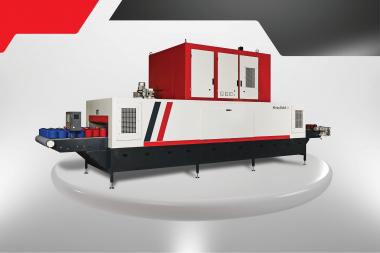Italian Textile Machinery at ITMA ASIA + CITME
Over 100 Italian companies are exhibiting at ITMA ASIA + CITME Singapore 2025, taking place from October 28 to 31. With an area of around 4,000 square meters, Italy ranks among the top exhibiting Countries, as in previous editions. 53 Italian exhibitors will show their innovations within the National Sector Groups, organized by ACIMIT (Association of Italian Textile Machinery Manufacturers) and Italian Trade Agency.
ITMA ASIA + CITME show has always been the main showcase for textile machinery manufacturers in Asia, which absorbs 50% of global exports for a value of 8.8 billion euro in 2024. The main world market for textile machinery are China and India, importing textile machines for a total value of 4.3 billion euro.
For Italian manufacturers as well, the Asian market is the top foreign destination. In 2024, Italian exports to Asia amounted to 664 million euro, while in the first six months of 2025 Italian sales to this geographical area grew at 1% rate on the same 2024 period, reaching a value of 317 million euro. China, India, Pakistan, and Bangladesh are the main Asian destinations for Made in Italy machinery.
ACIMIT President Marco Salvadè says: “ITMA ASIA+CITME Singapore is a further occasion for Italian textile machinery manufacturers to display its updated technological supply. The choice of Singapore allows Italian exhibitors to engage with many Southeast Asian markets, which are becoming increasingly important manufacturing hubs.”
"Despite geopolitical uncertainties, the significant presence of Italian exhibitors in Singapore confirms the vitality of the Italian textile machinery sector. " confirms Salvadè. " Italian manufacturers at ITMA ASIA+CITME Singapore will show a wide range of advanced solutions, covering the entire textile value chain. Visitors will see digitalization tools that can improve process efficiency and connectivity, automation systems for smarter production and innovations able to reduce environmental impact. In addition, there will be a strong focus on sustainable technologies, with machinery designed to optimize energy and water use, while ensuring high - quality results. Italian manufacturers are committed to combining tradition in textile knowledge with cutting - edge innovation."
On his side, Giorgio Calveri, Director of ITA Singapore, states: "With 8 6 % of its 2.1-billion-euro production exported, Italy’s textile machinery industry confirms its strong international orientation, with Asia as its main market. ITMA Asia + CITME 2025 in Singapore is a strategic opportunity to strengthen Italy’s presence in this key region. With 100 exhibitors coordinated by ACIMIT and supported by ITA, Italy stands as a trusted partner for advanced, sustainable, and competitive technologies."
ACIMIT






















